|
Nip back to the first half of the 20th century and few filmmakers seemed to have a problem with romanticising locations, historical events and even entire peoples, and audiences cared little as long as the result delivered the entertainment goods. Take Vikings as an example, seafaring Norse raiders and traders who were at their most active between the 8th and 11th centuries, during which time they established themselves in England to such a degree that the country was twice ruled by Viking kings, with the brilliantly named Sweyn Forkbeard succeeded by his modestly titled son, Canut the Great.
Despite having a Danish brother-in-law, my knowledge of Viking history only stretches so far, and I'm not really in a position to tell you much about how they behaved when on home turf, but I have a sneaking suspicion that it wasn't quite as boisterous as it's portrayed in Richard Fleischer's terrific 1958 The Vikings, even though we'd all love to believe it was. If the film is to be believed, life as a Viking was one never-ending party, one in which the menfolk only paused their raucous drinking and feasting to sleep off the effects, launch raids on enemy territory and make baby Vikings. As so often in depictions of societies in which manliness is worn as a badge of honour, the women by comparison tend to get something of a raw deal, being around primarily to serve the men in every reading of the term, while any woman accused of infidelity is clamped into a stock and has axes thrown at her pinned-down pigtails by her drunken husband.
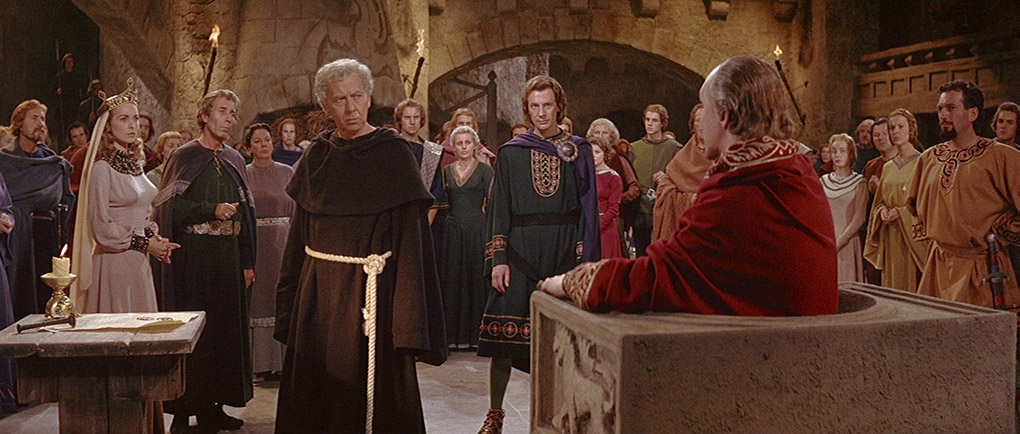
The Viking community here is ruled by Ragnar (Ernest Borgnine), who I gather is based on Ragnar Lodbrok, a character from Norse poetry who may or may not have been a real person, depending on which historian you talk to. In the opening scene, he leads a raiding party on an English encampment, where he kills the King of Northumbria and rapes newly widowed wife Enid. As Edwin died without producing an heir, his weasel of a cousin Aella (Frank Thring) ascends to the throne instead, unaware that Enid is pregnant with Ragnar's child. The child is born in secret and smuggled to Italy by those loyal to the former queen, and tied around his neck is the pommel stone from the symbolic royal sword, a talisman by which he can be recognised when he grows to adulthood.
20 years later, Aella initiates an alliance with the King of Wales by agreeing to marry his beautiful young daughter, Morgana (Janet Leigh), who's clearly not overjoyed at the prospect. Aella also takes this opportunity to accuse Lord Egbert (James Donald) of treachery and have him locked up, but when he attempts to have him quietly murdered, Egbert escapes and seeks refuge with Ragnar, whom he has indeed been secretly assisting.
It's when Ragnar's boat returns to home turf that we first meet his son Einar (Kirk Douglas), a warrior so vain about his good looks that he won't hide them behind a beard and "scrapes his face like an Englishman." Steady on. This all changes when he has a run-in with a young man named Eric (Tony Curtis), whose falcon attacks Einar and tears out one of his eyes. Condemned to a slow and watery death, Eric is spared by a chance change in the weather that is chalked up to Odin and the intervention of Lord Egbert, who realises that the talisman Eric wears around his neck means that he is the son of the late queen and figures he might be a useful man to befriend. Eric becomes Egbert ‘s slave and the conflict between him and Einar continues, reaching a peak when Einar kidnaps Morgana and both men become instantly captivated by her beauty.
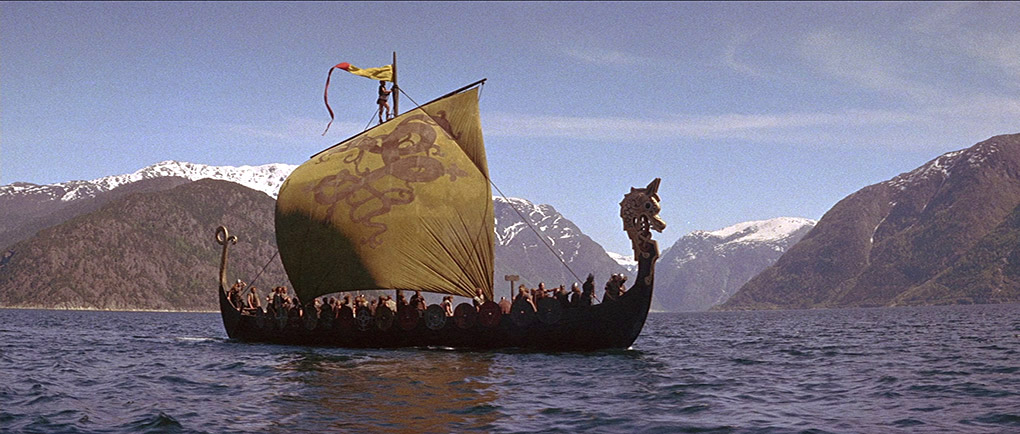
Cheerfully fanciful though the party-animal aspect of Viking home life may be, the film still scores some serious points for the authenticity of its architecture, costumes and sea vessels, refusing to kit out its warriors in the clichéd horned helmets, constructing exact working replicas of the original Viking ships, and filming on actual Norwegian fjords. But while it may have a documentary sounding title, The Vikings is not a history lesson but a rollicking action-adventure tale and on that score, it delivers in spades. Its story development is more substantial than the average Hollywood historical epic, something accentuated by Fleischer's skill for brisk pacing and economic storytelling, pausing only to allow us to appreciate the site of Ragnar's ship gliding majestically across the water towards home turf.
The Vikings is a visually sumptuous film, not by packing as much detail and as many extras into the scope frame as possible in the manner of so many Roman epics, but because master cinematographer Jack Cardiff knows how to compose striking exterior wides and light interiors in a manner that feels authentic to logical light sources without sacrificing clarity. It's a similar story with Harper Goff's production design, which enriches the look of the film but always feels earthily grounded in reality. Although solidly adapted from Edison Marshall's novel The Viking by a trio of individual writers and re-writers (including Dale Wasserman and Paths of Glory co-writer Calder Willingham), it's the spot-on casting and earnest performances that the film tends to be remembered for. Executive producer Kirk Douglas growls and intimidates impressively as Einar, and certainly has the physicality of the 20-something Viking he is masquerading as, being 42 at the time and six weeks older than Ernest Borgnine, who plays his father with enjoyable gusto. Tony Curtis does a creditable job of balancing nervous apprehension with fiery determination as Eric, while Janet Leigh (then Curtis's wife) radiates enough seductive beauty as Morgana to convince you that both Einar and Eric could so quickly fall for her in a land that was likely littered with striking looking women even back then. A number of the supporting roles also really register, notably Frank Thring's enjoyably oily turn as the scheming Aella (another character who has a basis in historical fact), and the always commanding James Donald as Lord Egbert.
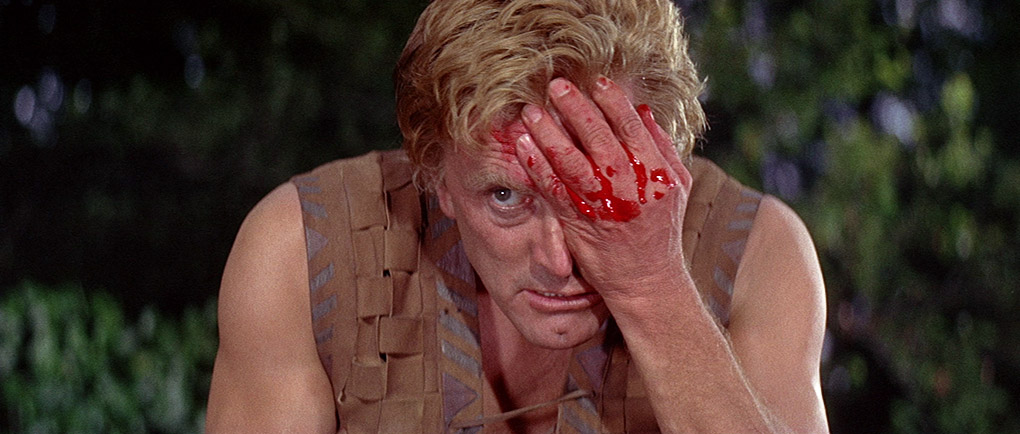
It all builds to a thrilling assault on an English (actually French) castle and an extraordinary swordfight on its circular battlements, shot from extreme angles to emphasise the combatants' distance from the ground and adding a very tangible level of danger to an already convincingly physical battle – swords are swung here with potentially lethal force and do visible damage to stonework when they make forceful contact. It's a belting one-on-one climax to a handsomely mounted, excitingly paced and compellingly played example of romanticised history at is most entertaining, and in its teaming of Kirk Douglas and Tony Curtis, it looks forward two years to their memorable partnership in Stanley Kubrick's masterful Spartacus, a film which Douglas also executive produced. And yes, that's an uncredited Orson Welles who provides the film's opening narration.
The Vikings was shot in Techniscope, a little-used rival to Cinemascope that and the blood brother of VistaVision, in which the film is run through the camera horizontally instead vertically and where each frame uses twice the film area of the CinemaScope equivalent, resulting in a corresponding increase in picture detail. This is reflected in the often striking quality of the transfer here, which boasts vibrant colour, impeccably judged contrast, an eye-popping sharpness and level of picture detail, and a fine level of organic film grain. It's a terrific restoration, albeit with a couple of small caveats. Although largely clean and clear of any damage, a few dust spots do remain and there is some minor flickering visible, plus one brief shot that has a serious case of the jitters. This also has to be the first HD transfer I've seen in a long while in which some of the reel change markers are still present (suggesting a print or inter-positive was used for the at least part of the restoration). That aside, a lovely job.
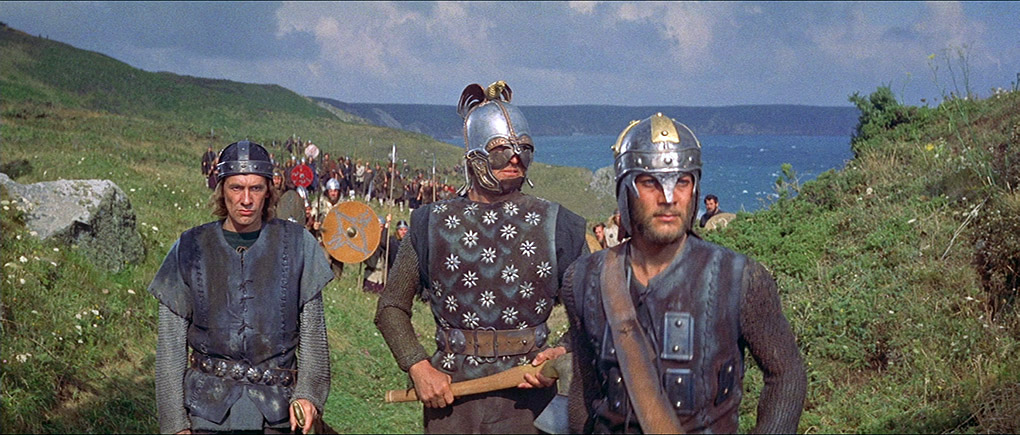
A clean and clear Linear PCM 2.0 mono track with a couple of small pops on reel changes but no trace of background his or damage.
Optional English subtitles for the deaf and hearing impaired have been included.
Sheldon Hall on The Vikings (32:54)
Film historian Sheldon Hall delivers a typically comprehensive appraisal of the film and a good deal of useful background on the production, including the conflicts between director Richard Fleischer and producer-star Kirk Douglas that are tactfully sidestepped in the special feature that follows. He makes an interesting case for the film as an authentically pagan movie, salutes the economy of its storytelling, examines the double relationship triangle at its core, highlights elements that are historically accurate, and explores Fleischer's career in useful detail. Although conducted largely as an interview, there's a sizeable audio only midsection which was clearly recorded separately (there's a change in sound quality and a small drop in volume) and is illustrated with relevant clips from the film, and thus plays like a mini-commentary track.
A Tale of Norway (28:16)
Recorded on standard definition, presumably for a previous DVD release, this half-hour featurette is presented by director Richard Fleischer, who after a to-camera introduction takes us on a trip through the making of the film, illustrated by on-set photographs, film clips and production design illustrations. There are plenty of interesting and entertaining stories here, but the less harmonious aspects of the production are completely glossed over – if you go by this, then Kirk Douglas was a joy to work with and Calder Willingham was the film's one and only screenwriter. As soon as you've watched this, check out the booklet for Fleischer's uncensored take on the experience of making the film.
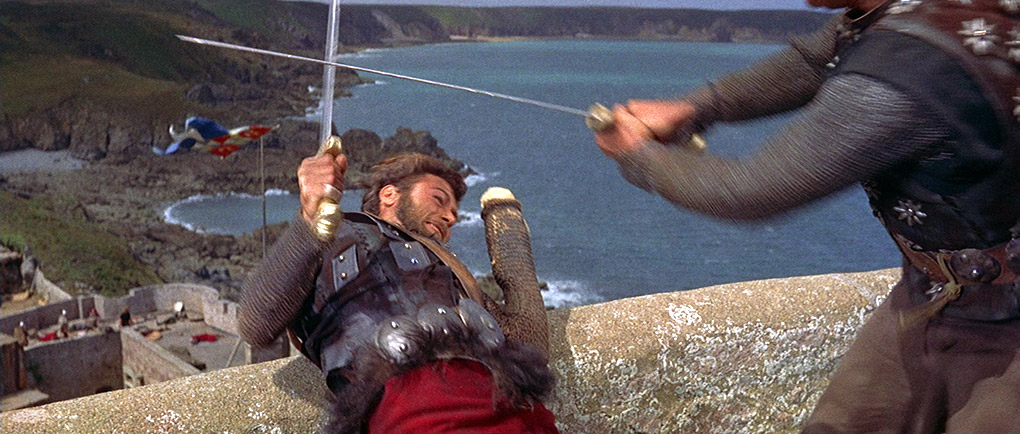
Theatrical Trailer (3:26)
An unsurprisingly and enjoyably hyperbolic sell, sourced from a standard definition video original if the scan lines are anything to go by.
Booklet
There's only one textual piece in this booklet, but it's a goodie, a 1993 piece in which Richard Fleischer recalls in enthralling detail some of the more memorable aspects of the making of the film, but without the tactful fact-massaging of A Tale of Norway. What comes across clearly here and gets no mention in the video piece are the problems he sometimes had working with Kirk Douglas, which is summed up by his assertion, "never work with a producer who is also the star." This is balanced by his admiration for Douglas's commitment to process of moviemaking, and there's a hair-raising tale about the shooting of the Viking funeral finale. There's also a coda in which Douglas admits what a difficult bugger he could be to work with. Great stuff. Also included is a splendid selection of international posters for the film, plus the main credits and the standard viewing notes.
A favourite from my younger days that has stood the test of time handsomely thanks to Fleischer's skill for tight and economical storytelling, Jack Cardiff's gorgeous Techniscope location and studio cinematography, the authenticity of Harper Goth's production and costume design, a string of fine performances and so much more. A couple of small ticks aside, the HD transfer is superb, and the special features, though limited in number, are all first-rate. Highly recommended.
|